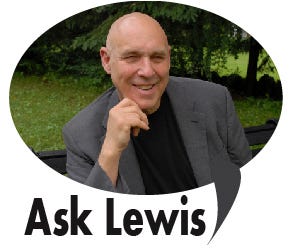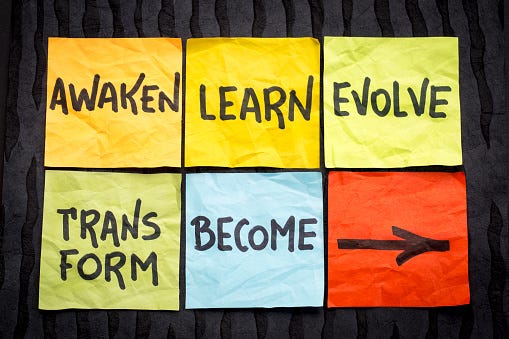What is the Power of Myth?
...And what is defined as a Myth?
“This newsletter serves a demographic of highly intelligent readers, deep thinkers, life hackers, preppers, entrepreneurs, and survivalists. I especially focus on those with a passion for ideas, critical thinking, strategic game theory, and a desire to understand the world around them. Readers of my posts are usually tired of being patronized elsewhere by fact-less, opinionated know-nothings, misinformation, conspiracy theories, and fake news.
“Knowledge is power, wisdom brings meaning, contentment, and happiness!”
The Life Strategies Playbook & Mentoring Program is a reader-supported publication. To receive new posts and support my work, consider becoming a free or paid subscriber. (Sign up for free at the end of this newsletter)
———————————————————
———————————————————
On a personal note: Please excuse grammatical errors, typos, repetition, and any general nonsense, and such in this post. I am getting a bit older now, and I have about 20,000 pages of information that must get published before I leave the mortal coil. I simply write and publish more than my humble editors are able to correct. If you find enough errors you are welcome to contact me about being an editor of my work.
Thanks for sharing this newsletter with your friends and associates -
———————————————————
I first became interested in myths after reading books and watching videos on the subject by Joseph Campbell.
According to Campbell, a myth is a folklore genre consisting of narratives that play a fundamental role in a society, such as foundational tales or origin myths. Since "myth" is widely used to imply that a story is not objectively true, the identification of a narrative as a myth can be highly controversial.
Two common questions are “what is myths and examples?” (Poor grammar but that is how they are asked.)
What are the 4 types of Myths?
There are four basic theories of myth. Those theories are:
Rational myth theory: This is a theory that states that myths were made to better understand natural events and forces that occurred in the everyday lives of people. This theory also explains that the gods and goddesses controlled all of these happenings of nature. Examples of this type of myth are creation myths from different cultures.
Functional myth theory: This is a theory that states that myths are told about what types of things should and shouldn't be done, and the consequences for those wrongdoings. The functional myth theory also states that myths were created for social control and served the function of ensuring stability in a society.
Structural myth theory: This is a theory that states that myths are usually based on human emotion. These types of myths show the two sides of the human mind; the good side and the bad side. They show the divided self and the duality of human nature. Myths about Hercules show how the human mind can be both good and bad.
Psychological myth theory (PMT): This is a theory that states how myths are based on human emotion (as in structural myth theory). However, with PMT, myths are thought to come from the human subconscious mind. Cultures all around the world had similar fears, questions, and wishes which, to them, were unexplainable.
How to Understand the Best Sacred Myths
Many geneticists believe that we are hard-wired to;
• Create and tell stories
• Hunger for a connection to our source – what theologians and physicists alike call the “First Cause.”
Combine the two, and what you get is the creation and the sharing of sacred stories or myths. The word “mythology” (from the Ancient Greek word meaning “a story-telling” or a legendary-lore refers to a type of sacred story, often a merging of various folklores and legends that a particular culture believes to be true. Myths often use the supernatural to interpret these.
As with many stories it does not matter if the story at the base of the myth is true or false. To the culture within which the myth has evolved, it is usually by definition “true.” Most groups cannot exist without some form of sacred story since it is this “group story” that helps to make sense of the world. This story will describe how the world came about, how the culture was created, and the beliefs, ways of questioning, and concepts that have defined the group. The sacred myth answers these questions for it represents a collective preserved belief within the group even if that belief has no fact as the basis of this reality. For a particular culture, sacred myth is true even if not always factual. It is this key foundation that gives the group a reason to exist, even if the group is loath to acknowledge that there is nothing factual there. Now often these sacred stories originate from a historical event and at other times as a misinterpretation of some misdirected, sacred ritual. It is likely that human beings are hard-wired to believe and to have faith in something – anything. This may include certain beliefs, whether accurate or unsupported by logic or evidence. These will be created as sacred stories by individuals and by groups. These sacred stories will usually be presented as, “God said ‘this’” or some sacred text such as the Bible ‘says ‘ that,’” etc., etc. The dilemma a serious spiritual seeker faces is that while recognizing intuitively that sacred myths are essential for being part of a community many of these same sacred myths are the source of much unnecessary suffering.
The origins of many myths and sacred stories become obscure or completely rewritten over time. Many cultural stories, legends, and myths are part of some ancient oral traditions. Many of these mythological stories were written down after they were already in existence for hundreds or even thousands of years.
Creating Wisdom Myths
New technology and the multiculturalism that is increasingly influenced by the ever-expanding global economy have reshaped many of these legends and sacred stories in ways that could never have been conceived of even fifty years ago. In our modern and post-modern world, many traditionalists as well as unorthodox stakeholders acknowledge that clearly many seemingly contradictory ideas and objects of meaning are being forced to come in contact with each other, sometimes with great resistance from both sides. No matter how great the resistance, the passage of time and the constant cultural shifts of the modern age will reshape many sacred group stories - often removing the “sacred’ from them. Whether these shifts are imposed from outside or suddenly happen through some natural evolution, these changes will take place no matter how great the resistance to them may be. In time, group stories may:
Lose their importance and simply fade away.
Be absorbed or dominated by a newer story.
Morph into a new myth that reflects the new elements of modern culture.
Take on greater meaning and status.
You have your own stories, legends, and sacred myths, haven’t you? I’m sure many of them are just made up. Many group stories are made up as well. Who is to say, whose reality is the best one? Who is to say that some two, or three-thousand-year-old sacred story or sacred text isn’t just some made-up stuff? Here is the key point for the student of the Wisdom Path – Never judge someone else’s sacred myth or how someone else chooses to live his or her life. Focus on creating your new story, legend, or myth. Create one that is rooted in love. The intention to live with and through love, compassion, and kindness will help us to create new communities rooted in love, compassion, and kindness.
Once you have done this you can discard your stories.
History is not the truth, nor is it even based on facts.
History is just a large collection of stories. Even where the facts are verifiable, you never get all the facts; thus, the story you are being told is a selective presentation. There are probably other facts in the very same story that you are not aware of that would change the entire flavor, scope, and purpose of what is being told. This is one of the reasons why so many cultures have less concern with historical accuracy and a greater concern for the relevance of the story, for the story is an expression and reflection of the ever-unfolding community identity. There are hundreds of ways to create a story. There is narration, historical accounts, recitals, jokes, drama, tall tales, parables, comedy, legends, historical events, autobiography, myths, biography, exposés, legends, journalism, confessions, scripts, anecdotes, etc. Often, a decision needs to be made - here the narrative is internal and psychological. In other stories something must be accomplished - this is built around external events that either moves the process forward or become obstacles to the journey told in the story.
Storytelling: What is the process?
To be a human being by definition is to be a storyteller. Each of us owns and is owned by a personal story that we need to tell. We each have memories of the things that have happened to us. For many of us, the only sense of self we have is the story we have created. What is your story?
Creating Meaning through Story
Many people have no sense of who they are, separate from the story they have created about themselves. Like an actor in a movie all they are doing is living their idea of the “wife” story, the “husband” story, the “employer” role, reciting the “employee lines” etc. Much of what you think of as your personal, factual history is really a mix of fact and fiction filtered through your memory. Living life like this is to be a prisoner of your self-created past. For many, this is often frightening to hear. It is as if who you think you are, is not really who you are. But that “who you are” is based on what you remember as being your truth. It does not matter whether it is true or not, only that you believe that it is true.
It soon becomes clear that at some point in time you will remember things that were once forgotten. Even when you remember these events clearly, there is always the chance they might not have happened exactly as you have remembered them. Have you ever reminisced with a friend about some event, and this person had a totally different recollection of what you remember?
If you realize that life is a type of game, then you have the freedom to reinvent who you are. It is not as if you are creating a lie but rather are taking a look at the facts of your past from a new and different perspective.
What you recall probably did happen, just not exactly as you may remember it. This same event is remembered differently by others. In looking back at that event, you must realize that the memory you have of it was seen through your eyes when you were a younger person. How old were you when the event took place? What were your beliefs at that time? Who were your influences?
On the Wisdom Path, you can re-invent your story. You can re-invent the game of your life and by doing so you can experience a type of freedom that you never imagined possible. Now I’m not suggesting you lie about your past. I’m recommending you meditate on what you have been, and done, and who you are now.
Remember…Life is a process, not a conclusion.
You might also enjoy yesterday’s newsletter on healing and storytelling:
——————————————————————————————————————
Author: Hey there. My name is Lewis Harrison, and I am a transformational coach, teacher, and prepper. I am a proponent of entrepreneurism and also a writer and seminar leader. The author of over twenty books, and numerous self-improvement, business success, and personal development courses, I am the former host of a talk show on NPR Affiliated WIOX91.3 FM.
“I believe to be more effective, efficient, precise, productive, successful, and more self-aware we need a coach or mentor. I have always had coaches and mentors, usually more than one. If you are ready, willing, and able to give up your unnecessary struggle, consider contacting me about becoming your coach-mentor. We can begin with a fifteen-minute call to see what your needs and challenges are and how I can help you address them”.
———————————————————
The Course
I will soon be offering a 2 1/2 hour - five-part course on How to Find Happiness through the Best Self Improvement Tips. The tuition for the course is $47. Enrollment will begin in just a few days. The course will include tips on emotional healing, personal finance, simple living, and non-dogmatic spiritual practices. This low-cost, content-rich course will be fun, informational, motivational, and inspirational. Get ready for a life-changing experience!
Lewis
———————————————————
I can be contacted directly about the course, business and life coaching, and more advanced training in how to win the game of life, at LewisCoaches@gmail.com
To get regular tips, techniques, life hacks and prepper shortcuts join our Self Improvement for Beginners Facebook community of creators and innovators. It’s free. Click just below the arrow to join!
———————————————————
Join us for daily tips on self-improvement, personal development, and prepping at our free Self-Improvement for Beginners Community and Forum on Facebook. Click Below the arrow or cut and paste the URL to Join
https://www.facebook.com/groups/455029215769173
-Join my group of 18,000 influencers.
The Life Strategies Playbook & Mentoring







